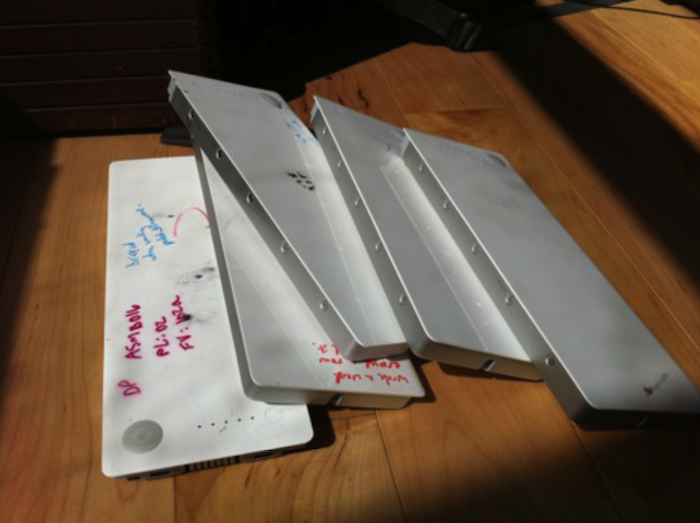Charlie Miller, a renowned white-hat hacker who works for security firm Accuvant, plans to reveal and offer a fix next month for a MacBook battery vulnerability he has discovered, Forbes reports. Miller uncovered default passwords, which are used to access the microcontroller in Apple's batteries, within a firmware update from 2009 and used them to gain access to the firmware.
Apple and other laptop makers use embedded chips in their lithium ion laptop batteries to monitor its power level, stop and start charging and regulate heat.
During the course of his tests, the researcher "bricked" seven batteries, rendering them unusable by rewriting the firmware. Of more concern is the possibility that hackers could use the vulnerability to install difficult to remove malware, or, in a worst case scenario, cause the batteries to explode.
“These batteries just aren’t designed with the idea that people will mess with them,†he said. “What I’m showing is that it’s possible to use them to do something really bad.†According to him, IT few administrators would think to check the battery, providing hackers with an opportunity to hide malicious software on a battery that could repeatedly implant itself on a computer.
MacBook batteries bricked during security researcher Charlie Miller's research
Miller admitted that he hasn't tried to blow up any batteries, but he did say it might be possible. "You read stories about batteries in electronic devices that blow up without any interference,†he noted. “If you have all this control, you can probably do it.â€
Another researcher, Barnaby Jack, who works for antivirus software maker McAfee, also looked into the battery issue a couple years ago, but said he didn't get as far as Miller did.
Miller, who is a regular winner of security contests demonstrating Mac, Safari and iPhone exploits, has notified Apple and Texas Instruments of the issue. Despite requests from several other researchers not to proceed, he plans to unveil the vulnerability, along with a fix he calls "Caulkgun," at the Black Hat security conference next month.
"Caulk Gun" will change a battery's default passwords to a random string of characters. While the fix will prevent hackers from breaking into the battery, it would also block any future firmware updates from Apple.
The state of security
In spite of the battery vulnerability that he uncovered, Miller believes Mac OS X security is better than ever before. According to him, Apple engineers made few security-related changes in the jump from Leopard to Snow Leopard, but they made substantial improvements in Mac OS X 10.7 Lion, which was released on Wednesday.
"Now, they've made significant changes and it's going to be harder to exploit,†he said, as noted by The Register.
“It's a significant improvement, and the best way that I've described the level of security in Lion is that it's Windows 7, plus, plus,†said noted security consultant Dino Dai Zovi.
Apple offered security researchers, including Miller and Dai Zovi, an unprecedented early look at Lion in order to get their feedback.
According to researchers, Lion's biggest security improvement is Lion's support for Address Space Layout Randomization. ASLR randomizes the location of critical system components to reduce the risk of attack. Apple also added sandboxing security measures in Safari that will isolate potential bugs or malware. Finally, the newly revamped File Vault now allows an entire drive to be encrypted.
 Josh Ong
Josh Ong




-xl-m.jpg)


-m.jpg)






 Chip Loder
Chip Loder
 Thomas Sibilly
Thomas Sibilly
 Wesley Hilliard
Wesley Hilliard
 Christine McKee
Christine McKee
 Amber Neely
Amber Neely
 William Gallagher
William Gallagher
 Malcolm Owen
Malcolm Owen









59 Comments
I'm on my second defective Apple Mac Book battery. It is in a middle 2008 polycarbonate 2.4 GHz Core 2 Duo model. The first one expanded so much that it pushed the track pad and some keys upward causing them to stick. The latest replacement decided it would not hold a charge more than one and a half hours for a while. Then it refused to hold a charge more than a few minutes.
This is from the batch that was recalled from Sony years ago. I assumed that they fixed the problem and stopped sending out defective ones. I assumed wrong.
Apple refused to replace the first one. So I reported it to the Consumer Products Safety Commission or whatever it is called. Only then did Apple contact me and offer to replace it. The replacement only worked for a few weeks before problems started. My laptop computer is not relegated to being a desktop computer.
Now that a software hack is about to be released into the world that could destroy more batteries, Apple had better prepare itself with some new batteries. What if such a hack or even a defect happens in the sealed batteries in the all aluminum models? That would be really bad.
Miller should get a life.
J.
seems like anyplace there is flash based firmware, there is a possibility that...well you know, someone could alter it. Which is kindof the whole idea in the first place.... you don't need an EEPROM burner to make changes nor physical access to the hardware.
I am not saying that there isn't a vulnerability, just that it isn't surprising that it exists.
Maybe we need less intelligent hardware???
I thought IBM compatibles had that covered
Of more concern is the possibility that hackers could use the vulnerability to install difficult to remove malware, or, in a worst case scenario, cause the batteries to explode.
Miller admitted that he hasn't tried to blow up any batteries, but he did say it might be possible. "You read stories about batteries in electronic devices that blow up without any interference,? he noted. ?If you have all this control, you can probably do it.?
I'm pretty sure the explosions happened because the hardware was defective and not the software. They found extra metal shavings in one batch of batteries that reacted so I highly doubt adjusting the firmware would cause an explosion. However, being able to brick a battery is enough cause for concern.